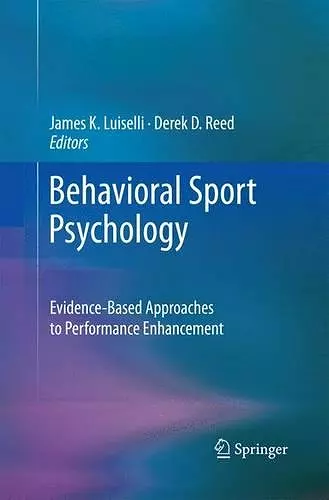Behavioral Sport Psychology
Evidence-Based Approaches to Performance Enhancement
James K Luiselli editor Derek D Reed editor
Format:Paperback
Publisher:Springer-Verlag New York Inc.
Published:21st Sep '14
Currently unavailable, and unfortunately no date known when it will be back

Sport psychology is a topic of growing interest. Many professionals read journals such as The International Journal of Sports, Journal of Sport Behavior, Journal of Applied Sport Psychology, Research Quarterly for Exercise and Sport, and The Sport Psychologist. In August 2008, Monitor on Psychology, the monthly publication of the American Psychological Association (APA), featured a special issue on sport psychology. Indeed, Division 47 of APA is devoted to "the scientific, educational, and clinical foundations of exercise and sport psychology." The North American Society for the Psychology of Sport and Physical Activity (NASPSPA) and the Association for the Advancement of Applied Sport Psychology (AAASP) convene conferences each year to present scientific findings and new developments in a rapidly expanding field. The AAASP and other organizations also qualify professionals as certified sport and exercise psychology consultants. Finally, a visit to any bookstore will reveal the lay public’s fascination with sports, as revealed in numerous self-help books and guides to perfecting athletic performance. Behavioral psychologists have studied sport psychology for more than three decades (Martin, Thompson, & Regehr, 2004). Applied behavior analysis (ABA), in particular, has been an instrumental approach to behavioral coaching in many sports, including baseball (Osborne, Rudrud, & Zezoney, 1990), basketball (Pates, Cummings, & Maynard, 2002), figure skating (Ming & Martin, 1996), football (Ward & Carnes, 2002), golf (Pates, Oliver, & Maynard, 2001), ice hockey (Rogerson & Hrycaiko, 2002), soccer (Brobst & Ward, 2002), swimming (Hume & Crossman, 1992), and tennis (Allison & Ayllon, 1980). ABA stresses the application of learning theory principles, objective measurement of athletic skills, controlled outcome evaluation, and socially significant behavior-change. Cognitive behavior therapy, or CBT, also has been a dominant approach to psychological intervention insports (Meyers, Whelan, & Murphy, 1996; Weinberg & Comar, 1994). CBT addresses athletic performance through cognitive-change methods combined with behavioral practice and environmental modifications. The purpose of the book described in this proposal is to compile the most recent experimental and applied research in behavioral sport psychology. Several journal articles have reviewed critical dimensions of behavioral sport psychology (Martin et al., 2004; Martin, Vause, & Schwartzman, 2005) but no book has covered the topic with an emphasis on ABA and CBT methodology and practice. Accordingly, Behavioral Sport Psychology: Evidence-Based Approaches to Performance Enhancement is a first of its kind volume.
From the reviews:
“Luiselli and Reed provide a thorough review of the more significant areas of behavioral sport psychology. The chapters are written by recognized experts in the field and provide readers with the most current thinking and research. … the book was written for an academic audience, practicing psychologists, and readers with an interest in athletics. … would be appropriate for less experienced readers, including those with a general interest in athletics. Overall, this book provides something of interest to most readers. Summing Up: Recommended. All levels.” (L. J. Burton, Choice, Vol. 49 (6), February, 2ISBN: 9781489987914
Dimensions: unknown
Weight: unknown
272 pages
2011 ed.